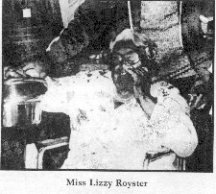| BURNT CORN, ALABAMA | ||
MISS LIZZY ROYSTER
Ms. Lizzy Royster was born in 1886, and lived in Burnt Corn most of her life.
At age 20, she married Ed Royster and made her home in Burnt Corn. She had six children.

A total of some twenty-five students shared the schoolhouse with Miss Lizzy Royster At 7:45 all were seated and devotion was read, after which roll was called. Each student would answer "present." In the morning history and English were studied. In the afternoon's geography, health and spelling gained the attention of the students. The students learned to spell by standing in front of the class, reciting, and then spelling the word. If it was spelled incorrectly the student moved to the back of the line. First through sixth grades studies together, while seventh and eighth grades were combined,
At lunchtime, Prince Tait, the schoolmaster, would say "All rise, girls prepare to pass." Then the girls would go to their locker and obtain their lunch buckets. Next, the boys would obtain their buckets. They were kept separate for most parts. Lunchtime lasted one hour. When it was time to return to class, the schoolmaster would stand in the door and ring the bell. The readers (what we refer to as grades) would resume studies.
During playtime, the girls usually were found playing baseball. Ms. Lizzy was especially fond of baseball. She considered herself a pretty good player. They also had favorite rhymes and songs of which she remembers with great finesse. The following one she performed with no hesitation...
"Here comes a gentleman...from Spain, To court your daughter Jane, My daughter Jane, she's almost too young to be courted by anyone. Let her be older, let her be young, It is her duty, and it must be done."
Miss Lizzy remembers trips to Burnt Corn (they lived on the outskirts of town) in a horse and buggy. The day that her mother and other women of the community were filled with quiltmaking, cooking, spinning fibers on spinning wheels, and weaving socks for the boys and stockings for the girls. The men spent their days hunting, fishing, farming, making baskets, or running businesses.
Church was an important part of their lifestyle. Socials at church provided many hours odf enjoyment. for example, on some occasions the ladies took box suppers to the church for the purpose od sharing them with the gentlman friend, and, of course, for raising funds for the church. The boxes were put in the middle isle and a partner (male friend) made their intent to bid on the lunch box. The congregation would sing ... "Where was Moses when the light went out" then a candle was lit and a Bible verse using the term light was read such as ..."God said, Let there be light and let your shine." The boxes were gathered from the middle isle and signatures on them read. The men bid and then escorted the respective lady to nearby shade tree to enjoy the meal. The boxes went upward of $1.00.
Miss Lizzy speaks of coffee that was green. They had to boil it to obtain the brown color and the taste desired. She also tells of a concoction good for ailments called Sassafras Tea. A red root found in the fields was washed, cleaned, and dried. After this process, the kettle was put on to boal with the root inside. Syrup was used to sweeten most times due to the unavailability of sugar. She also mentions that the men would let the syrup barrels be skimmed of their toppings in order to make a product called "Beer-Whiskey."
At the age of 10, Miss Lizzy moved to Monroeville with her family after her mother's death. The family was soon separated further with her move to Pensacola. She lived with her father's brother there, sitting (nursing) with those needing and doing some traveling. At age 20, she married Ed Royster and made her home in Burnt Corn. She had six children, two of which were in World War II. She remembers electricity being connected in Burnt Corn around the year 1945 and telephones being installed on the outskirts of town around 1954.
Ms. Lizzy Royster is a legacy that life is "perhaps" what we make of it. She is both an inspiration and a delight, I am proud to know her. Her commitment to life is reflected in her terninlogy..."praying till you get knots on your knees." (Interview with Mis Lizzy, 1988)